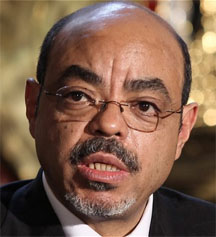ADDIS ABABA, (Reuters) – Thousands of Ethiopians descended on the centre of the capital Addis Ababa yesterday to mourn Prime Minister Meles Zenawi, their firm-handed ruler of more than two decades, whose body was flown home after his death in a Brussels hospital at 57.

Supporters mourned him as the saviour of a long-suffering nation and Washington praised its ally, but opponents hailed the death of an autocrat one group described as a “genocidal tyrant”. Traffic was congested from the airport to his residence, where his body was to be put on display.
Meles, whose death ended months of rumour that he was gravely ill, had seized power 21 years ago from a military junta that had become notorious around the world for policies that contributed to mass starvation.
A former guerrilla leader turned economic reformer, he had presided in recent years over some of the fastest growth rates in Africa. But Ethiopia still remains one of the poorest countries on earth, and his opponents say his suppression of dissent held the country back.
In recent years he had become a close ally of the United States in fighting Islamic militants in East Africa, especially in neighbouring Somalia, which he twice invaded. The White House mourned his “untimely loss”.
Deputy Prime Minister Hailemariam Desalegn will be sworn in as acting prime minister by parliament and the ruling party will meet to choose a successor but no date has been set.
Secretive to the end, Meles left it to officials of the European Union to disclose that he was being treated in the Belgian capital when he succumbed to an unspecified illness. Government spokesman Bereket Simon said only that he had been ailing for a year and died after being rushed to intensive care.
Since taking power in 1991 from Mengistu Haile Mariam’s military junta, Meles became one of the central political figures on the continent.
Along with Uganda’s Yoweri Museveni and Rwanda’s Paul Kagame, he formed part of a generation of ex-guerrillas that came to power in the 1980s and 1990s after horrific ethnic civil wars, and brought economic improvements and relative peace that they said justified ruling with a firm hand.
“The death of Prime Minister Meles has robbed Africa of one of its greatest sons,” the African Union, which is headquartered in the Ethiopian capital Addis Ababa, said in a statement.
Rights groups criticised him for cracking down hard on dissent but the West generally turned a blind eye to the repression, reluctant to pick a fight with a partner in the fight against al Qaeda-linked groups in Africa.
U.S. President Barack Obama offered condolences, praising Meles’s commitment to the poor and calling it an “untimely loss” for Ethiopia; British Prime Minister David Cameron described Meles as an “inspirational spokesman for Africa”.
An EU source said he had been a patient at the Saint-Luc University Hospital in Brussels.
His deputy Hailemariam said they had spoken only recently:
“He was recovering well, even taking part in light sporting activities. We were often in touch while he was recovering and we were optimistic that he would go on towards a full recovery,” he said. “Meles was one of a kind. It is very difficult to replace a man of his stature.”
In Brussels, a cortege accompanied by police outriders left a hotel next to the hospital, and took his casket to a private Belgian airstrip. Belgian military officials and police were there as it was loaded onto an Ethiopian Airlines jet.
Hours later in Addis Ababa, the coffin was carried out of the aircraft, draped in the green, gold and red national flag.
On the tarmac, a sister of Meles wept. “My brother loved this country. He deserved better,” she said, a black scarf covering her tearful eyes.
